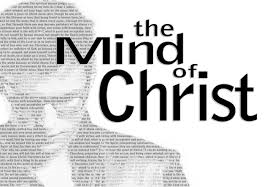I have been writing a lot in the past three years about violence and non-violence, and how to understand the violence of God in Scripture in light of the non-violent revelation of God in Jesus Christ. I hope to publish a book or two on this topic within the next year, so make sure you have subscribed to my newsletter to keep updated.
One common objection I often receive from people about a non-violent reading of Scripture is that it seems to contradict so many violent portrayals of God in the Old Testament. (It doesn’t … when you read the Old Testament through a particular lens, which again, I will talk about in my book.)
Sometimes people accuse me of cherry-picking verses from the Bible, but other times people say that we just have to accept what the Old Testament says about God, even if we don’t like it (Again, I believe I am doing this, but I just have a way of reading Scripture that differs from the way the proponents of a violent God read Scripture).
 One thing that some people say to me is, “You can’t argue against God. His ways are higher than your ways; His thoughts higher than your thoughts. For, as Paul says in 1 Corinthians 2:16, ‘Who has known the mind of the Lord that he may instruct Him?'”
One thing that some people say to me is, “You can’t argue against God. His ways are higher than your ways; His thoughts higher than your thoughts. For, as Paul says in 1 Corinthians 2:16, ‘Who has known the mind of the Lord that he may instruct Him?'”
Without a doubt, that’s true.
But I want you to notice something else Paul says as well.
1 Corinthians 2:16 and the Mind of Christ
In 1 Corinthians 2:16, Paul makes a statement that many people have either ignored or misunderstood.
After stating that his message of the Gospel centered around and focused on Jesus Christ and Him crucified (1 Corinthians 2:2), Paul goes on to say that focusing on the crucifixion of Jesus is what provides true spiritual wisdom and insight (1 Corinthians 2:6-9).
Paul says that what God has done in Jesus Christ was not known or anticipated by anyone or anything. But we have come to understand it, Paul says, because we have the Spirit of God, and God’s Spirit understands these things (1 Corinthians 2:10-15).
Then, at the end of this explanation, Paul states what was probably an objection he sometimes received from people who heard Paul preach. It is also an objection I have heard. And it might be an objection you have sometimes heard.
The objection is this: “But who has known the mind of the Lord that he may instruct Him?” In other settings, the objection might be stated this way, “Our thoughts are not His thoughts. Who are you, oh man, to talk back to God? His ways are higher than our ways! His thoughts are higher than our thoughts.”
And do you know what Paul says to that? He says, “But we have the mind of Christ.”

In other words, Paul is saying, “His thoughts are higher than our thoughts? Sure they are! But thankfully, we have the mind of Christ, which means that His thought are our thoughts. You say we cannot understand what God is doing in the world? Sure we can! For we have the mind of Christ!”
Now this isn’t a super strong argument, because as soon as you tell another Christian they are wrong about something because you have the mind of Christ, they will answer right back that you are wrong because they have the mind of Christ.
So why does Paul use such a weak argument himself?
Because I don’t think Paul means that you and I individually have the mind of Christ. Rather, I think Paul was talking about the collective mind of all believers in Jesus. We, together, all of us, as the Body of Christ, have the mind of Christ.
What this means is that we can trust Jesus to guide and build His church in the direction He wants it to go.
It is a statement about the tradition and consensus of the church. Not that the majority is always right. No. Instead, the Spirit moves where He will, and the church follows along. As the Spirit leads and as the church follows, it is hard to discern where we are being led in the present, but we can look back and realize that we have been led by the Spirit to where we are today.
The Mind of Christ and the Leading of the Spirit in History
Take slavery as an example. When a movement against slavery was first introduced in Europe and then America, some of the most vocal opponents to this movement came from Christians. It was very easy for these Christians to defend slavery from the Bible (both the Old and New Testaments). But today, thankfully, slavery is universally condemned by Christians as being contrary to the will of God.
And while Scripture can be used to lead us toward the truth that all people are created equal, Scripture itself seems to lean more on the side of supporting slavery than speaking out against it. So how did the church arrive at a position of opposing slavery in all its forms?
 As far as I can tell, the only real explanation is “We have the mind of Christ.” In other words, God led us here, by His Spirit, in opposition to various texts and passages in God’s Word.
As far as I can tell, the only real explanation is “We have the mind of Christ.” In other words, God led us here, by His Spirit, in opposition to various texts and passages in God’s Word.
I think similar arguments could be made for women’s rights, and environmentalism, and better working conditions, and a whole host of other issues which the church has traditionally opposed but in recent centuries has come to adopt wholeheartedly.
Sadly and ironically, the surrounding, non-believing culture has typically led the way on many of these issues, which has brought criticism from many of those within the church that all we are doing is following the culture. But couldn’t the explanation also be that God has been trying to get the church to move on these issues first in response to the Spirit and the Mind of Christ, but when we refuse because of tradition and Scripture, God causes “the stones to cry out” until we are forced to listen and respond? I think so …
When the church refuses to listen to the Mind of Christ and speak what the Spirit is saying to the church, Jesus usually gets culture, art, and music to cry out for Him.
So what about violence?
I believe a movement is going on in the church, as well as in culture, art, music, and history that seems to fit well with the Mind of Christ as revealed through the life, ministry, and teachings of Jesus. And what is this movement?
That God is love, and in Him there is no violence at all. That God looks like Jesus Christ, as one who would rather die for His enemies than call for the death of His enemies.
So is the Bible violent? Are there violent portrayals of God in the Bible? Of course. And as a result, the Bible has been used (and is being used today) to justify all sorts of violent behavior and actions and attitudes against others. But we have the mind of Christ, and I firmly believe that God, by His Spirit, is leading us to oppose violence in all its forms.
But only time will tell…




Good stuff.
??
Love this. Can’t wait for your book.
Many of us agree on this, even though we often defer to those who shout the loudest, as has been the case on many issues throughout the centuries.
There seems to be ample evidence that the Spirit of Christ moves among his people, and this seems to be happening even today. Who among us can say that the Spirit would not be moving in this violent world and our violent society, pointing us to nonviolent solutions before we succeed in destroying humanity?
Some understandings of the Old Testament, the book of Revelation and certain other passages notwithstanding, how can we possibly think God created us so that we would destroy each other, that we would degrade or enslave each other? Why are we afraid to call such thinking misguided at best, evil and sick at worst? That does not look like Jesus. If it doesn’t look like Jesus, it doesn’t look like God. It looks like twisted human thinking.
Should we tell God what ‘Love’ means? Or should we adopt a humble attitude and let God teach us the definition of ‘Love’?
Is it possible to have a loving God that isn’t Just? If God is Just, should humans tell God how He can express this justice?
The Old Testament prophets confirmed their message with miracles, parting of seas, chariots in the sky, plagues of Egypt, shekinah glory hovering over the Temple, prophecies predicting the future. Jesus also affirmed the validity of the Prophets. What convincing, confirming signs can those teachers of today point to to say that they have more authority than Moses and the prophets and that we should accept their message and call Moses and the prophets delusional?
Jesus did teach us what love means and it did not look like killing other people. Neither Jeremy nor I are suggesting that humans tell God how to “express” justice. Nor did we call Moses or the prophets delusional. You are arguing against things we did not say. Apparently we do not understand some passages like you do. Let’s wait until Jeremy’s book or books come out to see how he understands this and then we can all discuss it further.
This is not a matter of who is right and who is wrong, and who needs to set whom straight. Many people I know who were very adamant on what the Bible had to say on some issue changed their mind over the years and now see it differently. Many genuine followers of Jesus understand these things in a variety of ways. Maybe that has something to do with why we have thousands of denominations in Protestantism. There are a handful that think they are the only ones who have everything figured out correctly, and the thousands of others think they’ve gone off the deep end. Eventually even those groups can’t agree with each other and divide.
Sam – you wrote:
Neither Jeremy nor I are suggesting that humans tell God how to “express” justice.
I disagree. The Old Testament prophets present God’s expression of justice, you and Jeremy have your own idea of what ‘love’ is and that it precludes that expression of God’s justice explained by the prophets.
you wrote:
Nor did we call Moses or the prophets delusional.
What word would you call it then? You have both said repeatedly that the statements made by the prophets should be rejected. Ok then. Were they deluded or were they lying? Are you then saying that they told dozens of lies, knowing they were lies? Isn’t that worse?
You wrote:
Apparently we do not understand some passages like you do.
This is true and that’s fine.
Once again Dave, you are telling me what I said and what I think, but I did not say those things, and do not think what you claim I think. You do not know me personally. We have not communicated with each other except on this blog, so unless I said it here, you don’t know what I think. I did say that Jesus taught us what love means. Read the Gospels, not only what Jesus said, but the stories about what he did. That will tell you what I think love is. I never said the statements made by the prophets should be rejected. I said I understand some of what they said differently than you apparently do, but in no place said I reject them, that they were deluded or lying. Dave, you are imagining what you suppose I think or are guessing at it. That makes it very difficult to have a conversation with you.
Sam, I’m imagining nothing. The only other possibility is that someone has posted using your name. I was merely reiterating what someone claiming to be ‘Sam Riviera’ has communicated previously in multiple posts. If that’s the case, then I agree it would the conversation difficult.
In any event, i’ll reset the slate and assume I’ve never read any of your previous posts.
Just using your quote here in this thread:
Jesus did teach us what love means and it did not look like killing other people.
Ok, the way I read that, you are stating that love precludes killing. Or am I off base in how I interpret your sentence?
So, in your understanding, if an entity(Ie God) is loving, then that means(in your opinion) that it’s impossible that they would ever, under any circumstances, kill a human? Or, is there ever a circumstance in which it would be possible that God could either kill someone(and still be loving) or command someone to kill someone(i.e. a prophet, judge, king, etc. and still be loving)?
Excellent Jeremy. Thanks
A great post Jeremy. It has now helped me work through many of the issues you raise. I have no doubt the collective mind of Christ in His bride is speaking out about many taboo issues of 30-100 years ago and change is happening. The sad thing is the institutional church does not get this collective thinking from Christ and pushes often its view through Church leaders who believe they know the truth and we must follow that. Fortunately that is changing through the mass exodus of believers from the institution itself. Christ is doing a new thing with His bride and for once our eyes are looking upwards to Him and not to a ….obey and submit leadership in all its forms. Blessings
There’s so much mental gymnastics in that post I can hardly follow it. Let me try, I’m open to corrections.
So, you claim to have the mind of God. Really? Wow. Impressive. Don’t be shy now. No false modesty. Not Napoleon, not Joan of Arc, actual God. Okay, I’m tightening my seatbelt.
But, but … no, you Christians all disagree about almost everything. Okay you had me going for moment … oh wait, SO not individually but collectively, the hive mind … yep, I see. Somehow in the wash it all comes out good. That’s fortunate. So you don’t have and you do have the mind of God, it’s a group thing … lot of sharing … okay.
Nnnnow the Spirit leads and the church follows. This seems like the claim is being watered down just a little. Actually a lot, but that’s good.
Okay, the church that has the mind of God supported slavery, and so does the Bible, but ….
Okay, the church has changed it’s mind, God’s mind, God’s mind changed the churches God’s mind, … okay, struggling here.
The popular culture lead the way, because the church that has the mind of God ignored the mind of God, because it stuck to the Bible and Christian tradition, so God moved the popular culture … so the popular culture has the mind of God … no, that’s too far. Okay. Yeah.
Moving on, and … peace and love and non-violence, I believe blah, blah. Okay, the Bible is violent, God is violent, but God is leading us to oppose violence in all it’s forms.
Man, that’s, that’s messed up.
Wait for it. “Good stuff.” “Love this.” “Excellent.” “Great post.”
Okay… what’s a bad post? That’s too many questions.
Okay, Jeremy, you don’t have the mind of God … … … … sorry, got to break it to you. Breath deep, slowly, it’s going to be okay.
(MODERATOR: Refer to the Comment Policy. Future comments that including demeaning remarks about the writers of the posts or people who comment, or that include name-calling will be deleted, not edited as this one was. Disagree if you wish, but without snark or condescending attitude.)
I truley wish to understand that God is not violent and does not condone violence, but the bible seems to point to the contrary. In all on your post Jerermy you keep saying to wait for the book, but can’t you tell us openly how God is not violent in the scriptures in more detail?. I will still buy the book! Or maybe you can give a link to something that would explain in more detail, I am just not understanding this. thanks
Perhaps its time for more robust editing
I’m having a similar discussion with a relative of mine. Since we must face each other now and then we do not have the luxury of being smarmy and using ridicule as weapons. If we attempt to chew the whole of our disagreement, we are liable to cough up all kinds of bitterness. We’ve learned we should take each point and dissect it, chew it real good; then if that digests, go on to the next logical point. If we cannot get past the underpinnings of our separate views, we’ve learned for the sake of maintaining our relationship, to let it lay for awhile. By the way, if we believe the Bible to be wholly inspired, we should also believe the part which says, ‘the servant of the Lord must not strive, but be patient…’
To Master Nimmy…..I use to be a conformist but times change and now I am in a different space. However I have never found overt sarcasm to be a good tool for healthy debate. There are many other ways to portray disagreement.
Going through the Torah, there is a set of “this is what you do” and a set of “this is what you do not do.” Pay attention to those lists, especially what are often perceived as changes to those lists. Pay special attention to they why’s that are provided with those lists.
In most instances of violence, the choice was either violence today, or violence in the future. Perhaps not as blunt, and perhaps as unjust as the “do we hang them before or after we try them” phenomena, but it gets pretty close to that.
As far as Paul goes, the Tanakh is replete with examples of people arguing with, and, on rare occasions, winning their arguement with God. One can even make a case that an entire book is an arguement with God. God wins, but, to quote _The Message_, He “got to talk some sense into him.”
Jeremy–I do believe that you are correct in observing that most Christian churches do not have the proper understanding of God’s character.
I think this verse goes a long way into telling us what God is like :
1 Cor 13:4-7
Love is long-suffering, and is kind; love does not envy; love does not brag, is not puffed up,
does not act improperly, is not self-seeking, is not provoked, does not keep a record of wrongs,
does not rejoice in unrighteousness, but rejoices in the truth;
bears all things, believes all things, hopes all things, endures all things.